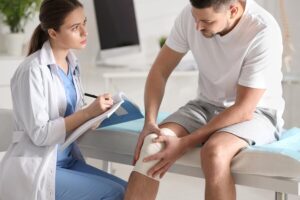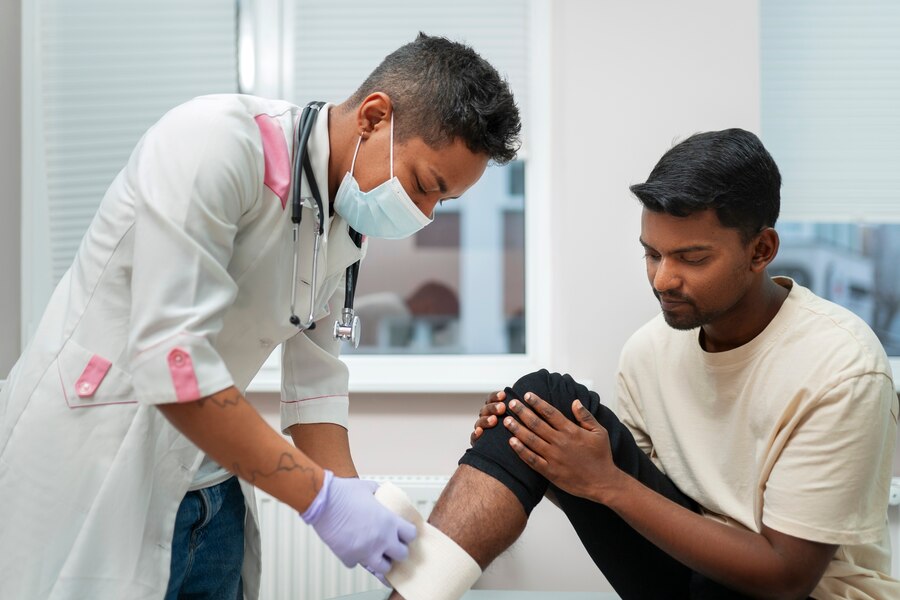Joint injuries can significantly affect mobility, comfort, and overall quality of life. Whether caused by a sudden accident, sports activity, or overuse, these injuries require prompt attention to avoid complications and ensure a swift recovery. Urgent care centers are equipped to provide fast, expert treatment for a range of joint injuries, offering relief when you need it most.
In this article, we’ll discuss the types of joint injuries, the role of urgent care in treating them, and what you can expect during your visit.
Understanding Joint Injuries
Joints are crucial for movement, connecting bones and allowing flexibility. When a joint is injured, it can cause pain, swelling, stiffness, and limited range of motion. Joint injuries vary in severity, ranging from mild strains to severe dislocations or fractures.
Common Types of Joint Injuries
- Sprains: Occur when ligaments (the tissue connecting bones) are stretched or torn. Common in ankles, knees, and wrists.
- Strains: Involve overstretching or tearing of muscles or tendons around a joint.
- Dislocations: Happen when the ends of bones are forced out of their normal positions, commonly in shoulders, fingers, or knees.
- Fractures: Breaks in the bones forming the joint. Severe fractures can disrupt joint alignment and function.
- Overuse Injuries: Caused by repetitive motions, leading to inflammation, pain, and wear on the joint (e.g., tendinitis or bursitis).
When to Visit Urgent Care for Joint Injuries
Not all joint injuries require a trip to the emergency room. Urgent care centers are ideal for injuries that are not life-threatening but still require prompt medical attention.
Signs You Should Visit Urgent Care:
- Moderate to severe pain in a joint
- Swelling or bruising around the joint
- Difficulty bearing weight or using the joint
- Deformity or unusual appearance of the joint
- Limited range of motion
Urgent care centers are well-equipped to treat these conditions efficiently, saving you time and money compared to an emergency room visit.
Diagnosis of Joint Injuries at Urgent Care
Accurate diagnosis is key to effective treatment. At an urgent care clinic, your evaluation typically includes:
- Medical History and Physical Exam
The provider will ask about how the injury occurred, the level of pain, and any previous joint issues. A physical examination helps identify swelling, tenderness, or deformities. - Imaging Tests
Urgent care clinics often have on-site X-rays and, in some cases, ultrasound equipment to assess the severity of the injury. These tests are crucial for identifying fractures, dislocations, or ligament damage. - Immediate Action for Severe Cases
For more complex injuries, such as severe fractures or joint instability, the urgent care team may stabilize the injury and refer you to an orthopedic specialist or emergency room for advanced treatment.
Treatment Options for Joint Injuries at Urgent Care

Urgent care centers provide a variety of treatments tailored to the severity and type of joint injury:
R.I.C.E. Protocol
For mild to moderate injuries, the R.I.C.E. (Rest, Ice, Compression, Elevation) method is a cornerstone of treatment:
- Rest: Avoid using the injured joint to prevent further damage.
- Ice: Apply ice packs to reduce swelling and numb pain.
- Compression: Use elastic bandages or braces to stabilize the joint.
- Elevation: Keep the joint elevated to reduce fluid buildup.
Splints and Braces
For dislocations, sprains, or fractures, urgent care clinics provide splints, braces, or slings to immobilize the joint and promote healing.
Medications
Pain relief is essential for joint injuries. Providers may recommend over-the-counter medications like ibuprofen or acetaminophen or prescribe stronger medications if needed.
Fluid Drainage
For injuries that cause significant swelling, such as a knee contusion with fluid buildup, a doctor may drain excess fluid to alleviate pain and improve mobility.
Reduction of Dislocations
If the joint is dislocated, urgent care providers are trained to perform manual reduction techniques, realigning the bones to their proper position.
Physical Therapy Referrals
Once the acute phase of the injury is addressed, many patients benefit from physical therapy to restore joint strength, flexibility, and function.
Benefits of Choosing Urgent Care for Joint Injuries
Urgent care centers offer several advantages:
- Convenience and Accessibility
Most urgent care clinics operate on a walk-in basis, providing immediate care without the need for an appointment. - Cost-Effectiveness
Urgent care visits are often more affordable than emergency room trips, making them an excellent option for non-life-threatening injuries. - Expertise and Equipment
With trained medical professionals and advanced diagnostic tools, urgent care centers can handle a wide range of joint injuries.
FAQs About Urgent Care for Joint Injuries
1. Can urgent care treat all joint injuries?
Urgent care is ideal for mild to moderate injuries like sprains, strains, and dislocations. Severe injuries, such as compound fractures, may require emergency care.
2. What should I bring to my urgent care visit?
Bring your ID, insurance card, a list of current medications, and details about how the injury occurred.
3. How can I manage joint pain after my visit?
Follow your provider’s instructions, use ice or heat as directed, take prescribed medications, and avoid activities that strain the joint.
4. How long will it take to recover from a joint injury?
Recovery times vary, ranging from a few days for minor sprains to several months for more severe injuries.
5. Should I follow up with a specialist after urgent care?
For ongoing pain or complex injuries, the urgent care provider may recommend a follow-up with an orthopedic specialist.
Conclusion: Seek Prompt Care for Joint Injuries
Joint injuries, while common, should not be ignored. Urgent care centers provide accessible, efficient, and affordable solutions for a wide range of joint injuries, from sprains and strains to dislocations. Seeking prompt care not only alleviates pain but also prevents complications and ensures a quicker return to normal activities.
Don’t delay treatment if you’ve sustained a joint injury—visit our urgent care clinic today to get the expert care you need for a smooth recovery (281) 741-3204 or visit us https://scchouston.co/

